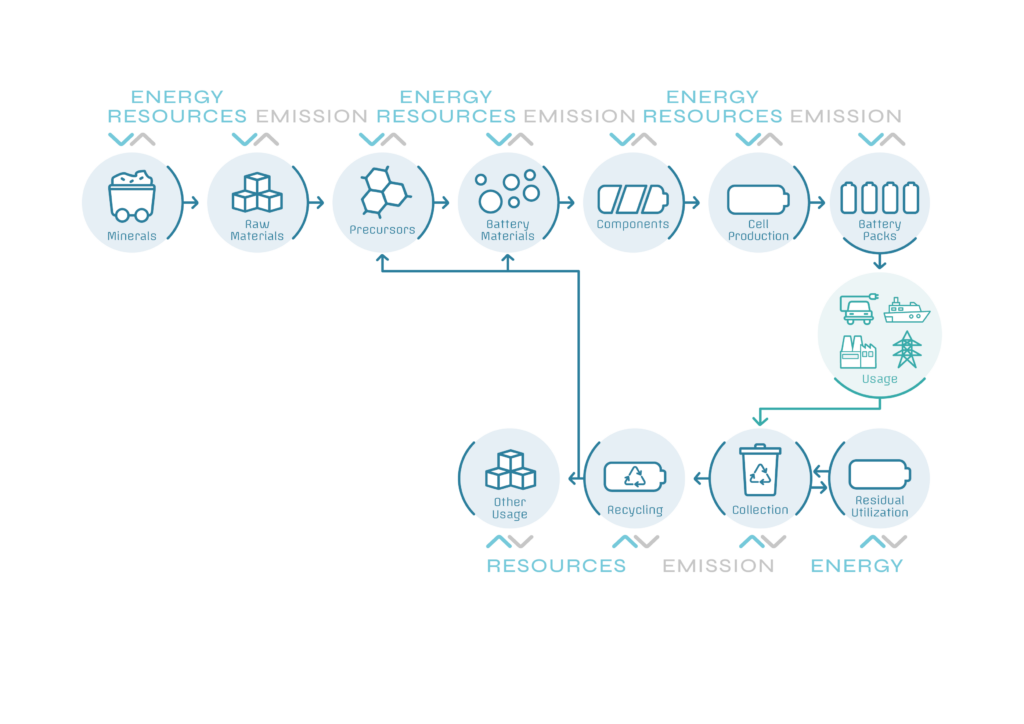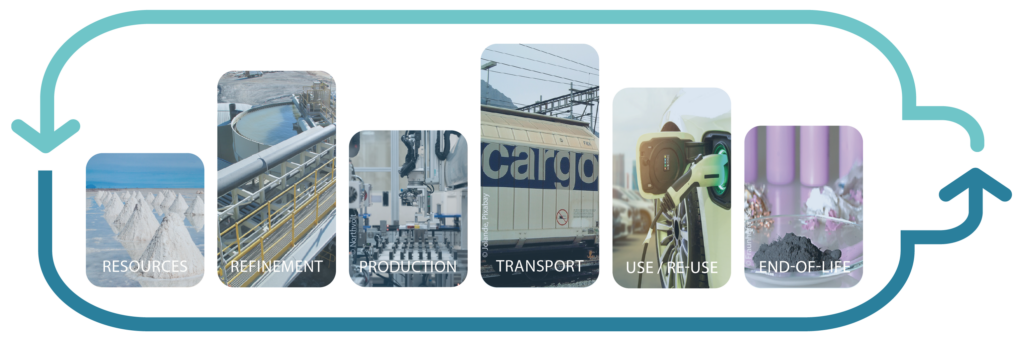HiQ-LCA Project Succeeds: Closing Data Gaps in Europe’s Battery Value Chain
With the conclusion of the project on December 31, 2025, the European HiQ-LCA project – funded by EIT RawMaterials – announces two major outcomes: the development of an automated data collection tool supporting the validation of Life Cycle Inventories and the planned establishment of a startup dedicated to the validation of Life Cycle Assessments.
Discover how the consortium is enhancing the transparency of LCAs, addressing regulatory requirements set by the EU Battery Regulation, and equipping the battery industry with tools and knowledge required to meet evolving sustainability demands.
The article describes how we have helped to close key data gaps along the European battery value chain and support companies in implementing the requirements of the EU Battery Regulation.
As part of HiQ-LCA, we have:
With an investment volume of €3.5 million, we have worked to create a reliable basis for consistent and traceable life cycle analysis along the battery value chain.
For industrial companies, the methods, data sets, and tools developed provide a sound basis for regulatory-compliant sustainability reporting and the further development of their own decarbonization strategies.
How reliable are today’s life cycle assessments?
The HiqLCA white paper highlights key weaknesses in current LCA practice and suggests ways to improve quality, transparency, and comparability.
A solid foundation for anyone who wants to critically reflect on and further develop LCA.
New Press Release: Circular Economy for batteries – workshop insights now online
What does it take to close the loop in Europe’s battery industry? Our latest press release recaps key findings from the HiQ-LCA workshop at LCM 2025 in Palermo – featuring expert insights, challenges in LCA verification, and a look ahead to new solutions like direct recycling and startup-driven innovation.
Read the full release and discover how HiQ-LCA is shaping the future of sustainable battery value chains.
This workshop is a free side event to DRC 2026.
February 3, 2026
9:30 a.m. to 11:30 a.m.
Join our free workshop featuring presentations from cell manufacturers such as ElevenEs and FAAM, recycling companies such as STENA and CellCircle, and a panel discussion.
This workshop is supported by EIT RawMaterials, Battery 2030+ and co-financed by the European Union. Learn about the European projects ReUse and HiQ-LCA and discuss the latest developments.
Each of the form fields is a mandatory field. We need this information to ensure the workshop runs smoothly.
Any questions about the workshop? Find further informations in our flyer:
Don’t hesitate to contact us:
Discover how to evaluate the environmental performance of tomorrow’s technologies today! Join our 3-hour online training on November 17, 2025, 09:00–12:00 AM, hosted by Leiden University as part of the HiQ-LCA project, with Dr. Robert Istrate. Learn the fundamentals of scenario-based and future-oriented LCA, explore practical modeling approaches, and work through real-world case studies with an expert instructor in sustainability assessment.
Program
9.00 AM Welcome and introduction to HiQ-LCA9.15 AM Foundations of prospective LCA
10.00 AM Foundations of scenario development
11.00 AM Hands-on: showcasing scenario modelling in practice
11:50 AM Wrap-up and concluding remarks
Secure your spot and gain the tools to make future-ready sustainability decisions! Register here!
Successful training on carbon footprinting in the HiQ LCA project
As part of the HiQ LCA project, a successful training course on carbon footprinting for products and organizations was held. A total of 100 people took part, including 11 on site, to gain practical knowledge about CO₂ balance sheets.
The training course on May 6, 2025 covered basic principles and regulatory frameworks (including ISO standards) and addressed the calculation of scope 1, 2, and 3 emissions. Particular emphasis was placed on data collection, the creation of emission inventories, and challenges in improving data quality.
Thanks to the interactive format, participants were able to contribute their own questions and discuss possible solutions together. The training promoted exchange and strengthened expertise in transparent CO₂ reporting.
We would like to thank everyone involved for their commitment and look forward to the next steps in the project
We proudly present a training session on “Carbon Footprinting of Products & Organizations” with Prof. Guido Sonnemann from the University of Bordeaux.
This focused three-hour hybrid training introduces participants to the fundamentals of Carbon Footprinting for Products & Organizations, covering key principles, calculation methodologies, and practical applications. Engaging discussions and case studies enhance the overall learning experience.
The training will take place from 9 am to 12 pm on the University of Bordeaux Campus, or online.
May 6th 2025 | University of Bordeaux | Zoom
Lorem ipsum dolor sit amet, consectetur adipiscing elit. Ut elit tellus, luctus nec ullamcorper mattis, pulvinar dapibus leo.
Lorem ipsum dolor sit amet, consectetur adipiscing elit. Ut elit tellus, luctus nec ullamcorper mattis, pulvinar dapibus leo.
The HiQ-LCA project, funded by EIT RawMaterials and co-funded by the EU, supports the battery industry in complying with the EU Battery Regulation by offering various tools and services, including an advanced Life Cycle Assessment (LCA) database to be developed as a satellite database of the renowned ecoinvent database. To foster collaboration and encourage data contribution, project partner ecoinvent successfully organized industry workshops in 2023 and 2024, bringing together stakeholders to address key challenges and promote transparency. By contributing data, industry leaders gain access to peer-reviewed LCAs, compliance support, and an enhanced role in advancing sustainable battery production.
The new EU Battery Regulation increases the transparency, traceability and timeliness of battery data that battery manufacturers must comply with. At the same time, market demand for batteries is expected to grow rapidly in the near future. Life Cycle Assessments (LCA) are a key component to improve sustainability along the entire battery value chain. Therefore, the EU-funded HiQ-LCA project aims to educate professionals from different fields, such as industry and academia, on the methodology, potential and use cases of LCA along the battery value chain. As a first step, the HiQ-LCA partner University of Bordeaux, in collaboration with the CyVi Group, conducted a one-day hybrid LCA training in Bordeaux as part of the project’s research measurements. This proved to be a promising basis for future regular LCA trainings.

The EIT RawMaterials-funded project HiQ-LCA proudly presents a workshop on “Better Battery Data – Collaborative data generation for high-quality battery LCA” with Prof Guido Sonnemann from the University of Bordeaux.
This event will include presentations and discussions on regulation policy, data management, and best practices in the battery industry.
The workshop will take place from 2 pm to 5 pm on the University of Bordeaux Campus, or join us online.
September 27th 2024 | University of Bordeaux | Zoom
This hybrid comprehensive one-day training immerses participants in the world of Life Cycle Assessment, covering foundational principles, impact categories, and applications.
Engaging discussions, networking breaks and case studies enhance the overall learning experience for all attendees.
The training will take place from 9 am to 5:15 pm on the University of Bordeaux Campus, or join us online!
May 6th 2024 | University of Bordeaux | Zoom
With contributing to the HiQ-LCA data set, your company or institute will significantly support the development of more differentiated life cycle assessment tools and data sets.
By participating, you will benefit from exclusive insights and interdisciplinary pioneering work.
Find more information about your option for data contribution here:
HiQ-LCA invites industry stakeholders to a virtual meet-and-greet with our partners. We will introduce the HiQ-LCA project and discuss your potential as data suppliers, our methods of data processing, and the benefits of a collaboration between academy and industry. If you have any questions, do not hesitate to contact Andreas Bittner (andreas.bittner@lithium-institute.eu).
The meeting was held online on November 30th from 9:00 am to 11:00 am.
HiQ-LCA joins the LCM 2023 and contributes a workshop as side event on Thursday, September 7th, 2023 in Lille (interactive face-to-face meeting). The workshop takes place from 18:30 to 20:00 on September 7th, 2023 in Room 0.2, Grand Palais Lille.
Individual mobility must become greener – this could briefly summarize the requirements for the future development of vehicles. The European Union, with its Green Deal, has set a goal of net zero emission cars, which is driving the growing market for electric vehicles. However, electrical mobility is often criticized for the environmental impact of the battery value chain and insufficient recycling activities. The European HiQ-LCA project aims to change this situation by enabling more reliable Life Cycle Assessment (LCA) based on better data and therefore, by empowering stakeholders to find the best starting points for greater sustainability in their production and recycling processes.

What data are the so-called Life Cycle Assessments (LCA for short) based on, how up-to-date are they and do they really reflect the current status quo for the ecological footprint of lithium-ion batteries? The HiQ-LCA project team has asked itself these questions and wants to fill the gaps with an advanced semantic database s and new validated data sets. Twelve well-known companies and research institutions will build a battery LCA database s and related battery-specific services for companies who are operating along the value chain and who want to reliably determine the carbon footprint of their processes and products due to the new Battery Regulation of the EU.
We proudly present a training session on “Carbon Footprinting of Products & Organizations” with Prof. Guido Sonnemann from the University of Bordeaux.
This focused three-hour hybrid training introduces participants to the fundamentals of Carbon Footprinting for Products & Organizations, covering key principles, calculation methodologies, and practical applications. Engaging discussions and case studies enhance the overall learning experience.
The training will take place from 9 am to 12 pm on the University of Bordeaux Campus, or online.
May 6th 2025 | University of Bordeaux | Zoom
Lorem ipsum dolor sit amet, consectetur adipiscing elit. Ut elit tellus, luctus nec ullamcorper mattis, pulvinar dapibus leo.
Lorem ipsum dolor sit amet, consectetur adipiscing elit. Ut elit tellus, luctus nec ullamcorper mattis, pulvinar dapibus leo.
This workshop is a free side event to DRC 2026.
February 3, 2026
9:30 a.m. to 11:30 a.m.
Join our free workshop featuring presentations from cell manufacturers such as ElevenEs and FAAM, recycling companies such as STENA and CellCircle, and a panel discussion.
This workshop is supported by EIT RawMaterials, Battery 2030+ and co-financed by the European Union. Learn about the European projects ReUse and HiQ-LCA and discuss the latest developments.
Each of the form fields is a mandatory field. We need this information to ensure the workshop runs smoothly.
Any questions about the workshop? Find further informations in our flyer:
Don’t hesitate to contact us:
This workshop is a free side event to DRC 2026.
February 3, 2026
9:30 a.m. to 11:30 a.m.
Join our free workshop featuring presentations from cell manufacturers such as ElevenEs and FAAM, recycling companies such as STENA and CellCircle, and a panel discussion.
This workshop is supported by EIT RawMaterials, Battery 2030+ and co-financed by the European Union. Learn about the European projects ReUse and HiQ-LCA and discuss the latest developments.
Each of the form fields is a mandatory field. We need this information to ensure the workshop runs smoothly.
Any questions about the workshop? Find further informations in our flyer:
Don’t hesitate to contact us:
How reliable are today’s life cycle assessments?
The HiqLCA white paper highlights key weaknesses in current LCA practice and suggests ways to improve quality, transparency, and comparability.
A solid foundation for anyone who wants to critically reflect on and further develop LCA.


This project receives funding from EIT RawMaterials and the European Union under the PROJECT AGREEMENT NO <22039>